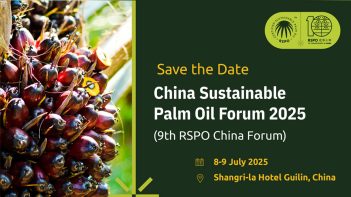In alignment with China’s national sustainable development policy, green financing initiatives are key to shifting to sustainable palm oil and heightened biodiversity protection
Chongqing, 20 October 2021: The 2021 China Sustainable Palm Oil Supply Chain Forum was held in Chongqing on 18 October, gathering nearly 100 participants who called for the shift to sustainable palm oil to enhance biodiversity conservation through green financing policies and heightened engagement with youth ambassadors.
The event, jointly organised by the China Chamber of Commerce of Foodstuffs and Native Produce (CFNA), the Roundtable on Sustainable Palm Oil (RSPO) and the World Wide Fund for Nature Beijing Office (WWF China), saw a broad range of stakeholders including government agencies, media, processors, manufacturers, retailers, and social organisations coming together to promote sustainable palm oil in China.
Aligning with China’s sustainable development strategy
Anne Rosenbarger, Global Engagement Manager for Commodities and Finance for the Global Forest Watch initiative at the World Resources Institute (WRI) and Co-chair of RSPO, underscored the need to switch to sourcing only certified sustainable palm oil to protect forests and the unique biodiversity within them.
“RSPO certified sustainable palm oil has 35% lower GHG emissions and 20% lower biodiversity impact from land use changes compared to conventional palm oil,” she said.
“I’m very excited about the opportunities to scale up the adoption of certified sustainable palm oil and I’m confident that China will play a leading role in helping us tackle some of the biggest problems in the palm oil supply chain. We support China’s broader commitment to sustainable development, highlighted by its pledge to achieve carbon neutrality by 2060.”
In his opening remarks, Mr. Cao Derong, CFNA President, shared that China had released the “Report on China’s Progress in Implementing the 2030 Agenda for Sustainable Development (2021),” which points out that the “14th Five-Year Plan” and the 2035 long-term goal clearly require the in-depth implementation of sustainable development strategies to promote a comprehensive green transformation of economic and social development.
“The promotion of sustainable palm oil is in line with China’s sustainable development strategy. As China’s largest international trade organisation of food and agricultural products, CFNA has always supported the promotion of sustainable palm oil in China,” Derong said.
Chief Programme Officer of WWF China Mr. Zhou Fei said, “As the Chinese government is committed to promoting the development of an ecological civilisation and advancing towards the goal of peak carbon dioxide emissions by 2030 and carbon neutrality by 2060, a growing number of stakeholders have made significant commitments to sustainable development. The sustainable transformation of the palm oil supply chain can only be achieved through multi-stakeholder cooperation.”
WWF China marked the occasion by releasing the China Sustainable Palm Oil Alliance (CSPOA) Progress Report.
The discussion also provided a platform for the 5th RSPO China Forum, where participants had a chance to hear the latest insights about global sustainable palm oil development, industry initiatives and key outcomes.
Mr. Zhong Xiaodong, representative of China’s Ministry of Ecology and Environment, called on more companies to join the work of biodiversity conservation and sustainable development in the UN Convention on Biological Diversity (CBD) COP15 year, and to continue implementing effective activities to support sustainable palm oil as one action of supporting the post-2020 global biodiversity framework.
Accelerating green finance
Green finance, which can be used to support a sustainable palm oil supply chain, was extensively discussed at the event too. This aligns with China’s President Xi Jinping’s pledge at COP15 to invest 1.5 billion yuan (USD 233 million) to establish the Kunming Biodiversity Fund.
Lifeng Fang, Forest Programme Manager of CDP, said “To date, China has 72 organisations that signed the UN Principle Responsible Investment and 14 banks signed the Principles for Responsible Banking. There are 60 financial institutions that have declared their support for biodiversity conservation at COP15. More banks and investors are supporting companies who are delegating to sustainable palm oil supply chain development.” Wang Ying, Director of Sustainable Development from HSBC Bank (China) and Ms. Du Hongxia, green finance expert from WWF also echoed this.
The forum covered numerous interactive sessions that allowed participating companies to share their experiences about sustainable palm oil production and consumption, which was fruitful for both upstream and downstream players. Senior representatives from some of the world’s largest businesses also shared about best practices used in promoting sustainable palm oil consumption.
Changemakers for Nature, a youth ambassador initiative which was launched by RSPO and Wildbound in 2020, emphasised the significance of sustainable palm oil and pointed out that to mitigate biodiversity loss, effective policies and programmes are needed to stop the clearing of pristine tropical forests. They stressed that choosing RSPO certified sustainable palm oil will not only help protect rainforests and safeguard its vulnerable biodiversity but will also help create fair socio-economic conditions in the global palm oil supply chain.
About RSPO:
The Roundtable on Sustainable Palm Oil (RSPO) was formed in 2004 with the objective of promoting the growth and use of sustainable oil palm products through credible global standards and engagement of stakeholders. RSPO is a not-for-profit, international, membership organisation that unites stakeholders from the different sectors of the palm oil industry including oil palm producers, palm oil processors or traders, consumer goods manufacturers, retailers, banks and investors, environmental or nature conservation NGOs, and social or developmental NGOs.
This multi-stakeholder representation is mirrored in the governance structure of RSPO such that seats in the Board of Governors, Steering Committees and Working Groups are fairly allocated to each sector. In this way, RSPO lives out the philosophy of the “roundtable” by giving equal rights to each stakeholder group, facilitating traditionally adversarial stakeholders in working together to reach decisions by consensus, and achieving RSPO’s shared vision of making sustainable palm oil the norm.
The seat of the association is in Zurich, Switzerland, while the secretariat is currently based in Kuala Lumpur with satellite offices in Jakarta (ID), London (UK), Zoetermeer (NL), Beijing (CN) and Bogotá (CO).
For further information, kindly contact:
| RSPO Communications Team |
Keep reading
Call for Expression of Interest: Nigeria National Interpretation Task Force for 2024 RSPO Principles and Criteria (RSPO P&C) and Independent Smallholder (ISH) Standard
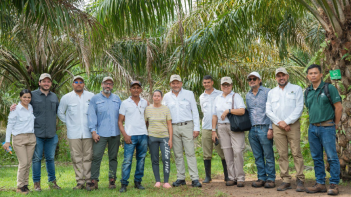
From Cocaine Processing to Cultivating Palm Oil: Resilience takes root in a Colombian community

Social Sustainability in Focus at the Europe Sustainable Palm Oil Dialogue
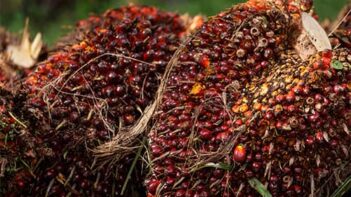
Cost-Benefit Analysis To Sourcing Sustainable Palm Oil in India [SUBMISSION BY 18 JUNE 2025]

RT2025 Early Bird Sponsorship ends soon!
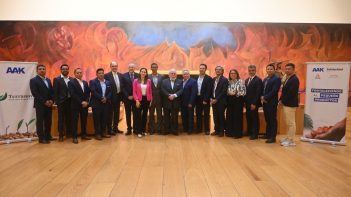
Mexico Reinforces Sustainable Palm Production: Key Players Expand MoU to Drive Positive Change
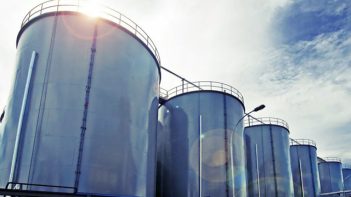
Mill List Submission

Come and Join us at the RSPO Booth in Palmex 2025 Jakarta!
